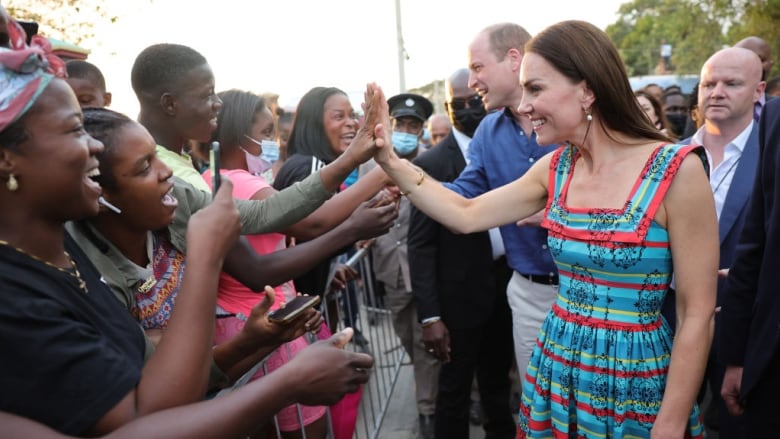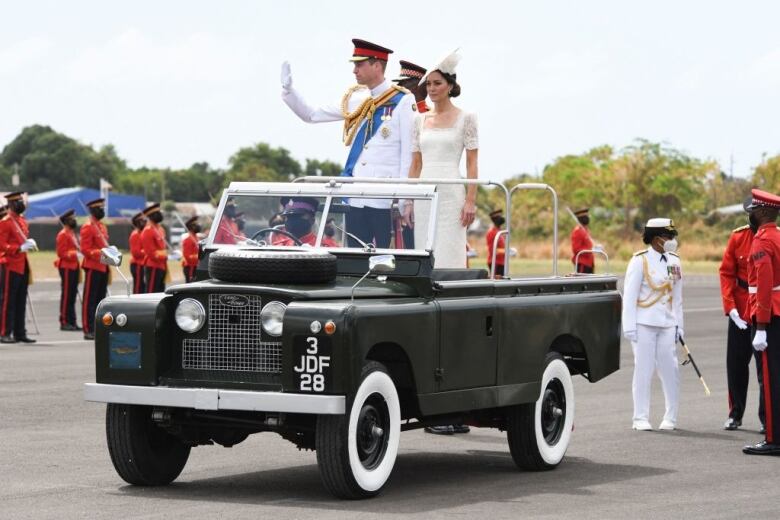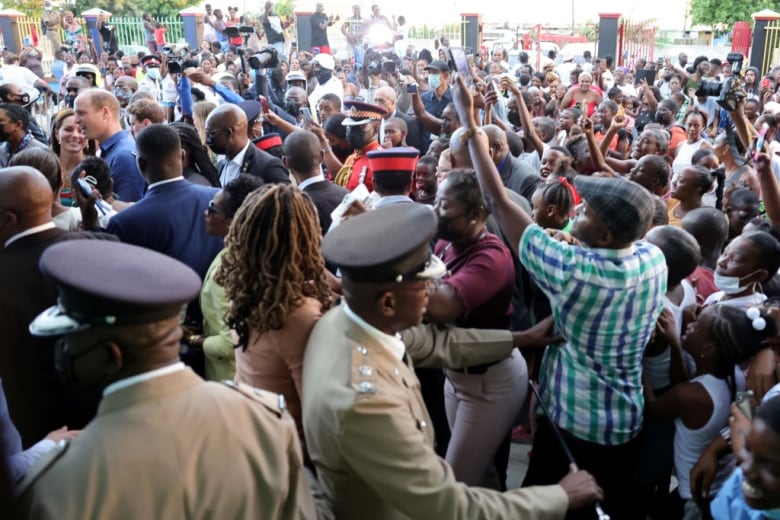What should a royal visit look like? Why William and Kate's recent trip might spark change for future tours
Duke and Duchess of Cambridge met with both protests and eager crowds in Caribbean

Hello, royal watchers. This is your regular dose of royal news and analysis. Reading this online? Sign up here to get this delivered to your inbox.
When Prince William and Kate, Duchess of Cambridge, set off for the Caribbean recently, their royal visit was, among other things, billed as an opportunity to celebrate local culture and commemorate Queen Elizabeth's 70 years as monarch.
Some also saw the first major overseas trip William and Kate have taken in more than two years as a bid to shore up ties between Britain and the Commonwealth countries on their itinerary: Belize, Jamaica and the Bahamas.
In the end, however, the week-long visit drew more headlines for protests, the republican sentiment fomenting particularly in Jamaica, calls for slavery reparations and uncomfortable, potentially tone-deaf moments that seemed more rooted in the past than looking toward the future.
"I think they've gone backwards, actually," British PR expert Mark Borkowski said in an interview. "It felt slightly colonial, the whole exercise."
Take, for example, the moment when William and Kate, dressed in white, rode in a military parade in an open-top Land Rover, a nod to a ride the Queen and Prince Philip took in the same vehicle more than five decades ago.

"It was not a good image," Borkowski said, likening it to something straight out of 1955.
Other images were happier. There were moments when people who came out to greet William and Kate were thrilled to see them, including one where, as the BBC reported, "wild cheers accompanied their every step and a walkabout at one point threatened to go out of control with excited people pressing them on every side."
The trip also gave them a chance to focus on some of their key interests — early childhood development for Kate, conservation for William, among others — and have some fun at a regatta.
"It's clear that the presence of the Duke and Duchess of Cambridge was often appreciated at a local level when they were meeting local organizations or shaking hands with people in the various communities," Toronto-based royal author and historian Carolyn Harris said in an interview.

Having moments on a royal tour that harken back to previous trips was no surprise — they've been a hallmark of such visits for generations. But now, they may seem out of place to some.
"When we see very visible aspects of continuity, such as the Duke and Duchess of Cambridge attending a military review in … the same vehicle as Queen Elizabeth … and Prince Philip did beforehand, that continuity can make royal tours look rather old-fashioned," said Harris.
And all that sets off a broader consideration for some about just what look is appropriate for a royal visit in a world where public perceptions are changing and there are deeper reckonings with the past, because of everything from Black Lives Matter to Barbados declaring itself a republic late last year.
"There's been a debate about what a royal tour should look like in the 21st century and are these larger events still suitable in the modern context, particularly in countries where there is a lot of debate and discussion about the future of the monarchy and whether there will be a transition to a republic," said Harris.

As William and Kate's trip came to its conclusion, British reporters were acknowledging a changing landscape.
"At the end of the seven days, it feels like we are in a new era for royal tours," wrote Sky News royal correspondent Rhiannon Mills. "It's been a wake-up that the optics of the past no longer work, and there is no going back."
ITV royal editor Chris Ship wrote that "always nodding back to outdated traditions leaves the monarchy open to the charge that the institution is out of date and backward-looking."
"What is the point of royal tours in 2022?" he asked.
"Royal aides will need to find a way to reorientate these visits to Commonwealth countries and beyond, so that they focus overwhelmingly on the future and not the past."

Harris sees the potential for future tours to more closely resemble what's called a "working" royal visit, when members of the family undertake lower-profile trips tightly focused on particular regions and the work of specific groups and charities in local communities.
"It's very clear that royal visits are very strongly appreciated at that level," Harris said.
There is still no public word on whether there will be a royal visit to Canada this year, but Harris noted that the 2002 visit to mark the Queen's Golden Jubilee came in the fall.
What about the monarchy's future?

Royal visits often prompt debate about the future of the monarchy, something our CBC friend Geoff Nixon took a look at following William and Kate's trip. Here's a condensed version of his report:
Prince William and Kate's visit to the Caribbean intensified a spotlight on Britain's colonial history, renewing questions about how much longer Commonwealth countries — including Canada — will have a monarch as their head of state.
The week-long tour drew protests and public demands for reparations for slavery, and saw unexpected news from Jamaican Prime Minister Andrew Holness that his country intends to become fully independent.
In doing so, Jamaica would become the second Caribbean country to cut ties with Queen Elizabeth in recent years — following Barbados, which did so in 2021.
But more countries in the region seem to be considering the possibility.
Gaston Browne, the prime minister of Antigua and Barbuda, told the Jamaica Gleaner newspaper last week that he believes "each country within the Commonwealth Caribbean all aspire to become a republic."
WATCH | Royal visit sparks unhappiness in Manitoba's Jamaican diaspora:
The question about the future of the monarchy is also on the minds of some Canadians — including those already convinced it's time to go in a new direction.
Selwyn Pieters, a Toronto lawyer and civil rights activist, said he sees no reason for the monarchy to remain in Canada.
"[Canada] doesn't need a monarchy supervising it," he said in a telephone interview last week.
A recent poll by the Vancouver-based Research Co. suggests a lot of Canadians would agree.
Slightly less than half of those surveyed said they wanted the country to have an elected head of state, according to the online poll of 1,000 adults that was taken over a three-day period in February.

Mario Canseco, the president of Research Co., said that figure — now "a whisker away from 50 per cent" — has been climbing in polls he's conducted in recent years.
"It's the highest we've ever had," said Canseco.
A further 18 per cent of those surveyed said they did not have a preference as to whether Canada remained a constitutional monarchy or not. Twenty-one per cent of those surveyed said they preferred for Canada to remain a monarchy.
CBC cannot accurately calculate a margin of error for online surveys. A probabilistic sample of the same size would yield a margin of error of plus or minus 3.1 percentage points, 19 times out of 20.
A Canadian Heritage spokesperson told CBC News that "the Crown in Canada contributes to a sense of unity, stability and pride among Canadians. As a constitutional monarch, the Queen is Canada's head of state and an essential part of Canada's system of government."
The spokesperson said that "no changes to the role of the Crown in Canada are being considered."
WATCH | Prince William expresses 'profound sorrow' for slavery, but no apology:
But Ashok Charles, executive director of Republic Now, a group that advocates for Canada to become a republic, said he believes that day will come.
"I find it appalling that we're holding onto the vestiges of the monarchy in the 21st century," said Charles.
"It can't continue."
Canseco said there have been fewer royal visits during the pandemic and he believes that's one factor in what is being reflected in the polls.
"They always find the opportunity to say that the monarchy has been popular because there's a lot of people lining up to shake hands with them," he said.
"But because of COVID and the lack of travel, they haven't been able to establish that emotional connection with the monarchy. And I think that is also partly responsible for the numbers dropping."

There have also been fewer public appearances.
On Tuesday, the Queen made her first major public appearance in five months at a memorial service for her husband, Prince Philip.
There are those in Canada who believe a shift away from the current system isn't the answer.
Rob Wolvin, who lives in Toronto, said he believes a constitutional monarchy provides a stability that is one of its advantages as a system. But that's not to say it needs to stay static.
"We need to allow our system to be tweaked," said Wolvin, adding he believes a shift to a republic does not guarantee a stronger or better democracy.
If Canada were to pursue a split from the monarchy, it would involve changing the Constitution to replace the Queen as head of state. To do that, it would have to enact article 41(a) of the Constitution Act of 1982, which requires a majority approval from "Senate and House of Commons and of the legislative assembly of each province."
"It's not going to be that easy, but it might be something worth exploring if we continue to see this climbing the charts," said Canseco, who intends to keep tracking the issue in polls.
More than memories of Prince Philip
The recent memorial for Prince Philip offered a chance to remember Queen Elizabeth's husband, nearly a year after his death at 99.
But in ways, public attention was focused more on ongoing questions and strife within his family.
"Even though the purpose of the memorial service was to honour Prince Philip, there was certainly a lot of interest in the Royal Family as a whole," said Harris.
Would the Queen, who turns 96 later this month, be there, given recent health concerns and worries about her mobility? She was.
And what about Prince Andrew? The second son of the Queen and Prince Philip recently settled a civil sexual assault case brought against him in the U.S. He has also lost all his military affiliations and royal patronages and stepped back from any public role. What kind of profile might he have at the service for his father?
In the end, Andrew escorted his mother on her short walk to her seat, an action that caught some people off guard.
WATCH | Queen attends memorial for Philip, escorted by Prince Andrew:
"There were some who viewed this as giving him too prominent a role in the ceremony," said Harris, "but others noted that by escorting the Queen to her seat and then sitting down, he wasn't walking the full length of Westminster Abbey with other members of the Royal Family, where there would have been more opportunity for photographs to be taken."
Borkowski said Andrew's actions "really angered" a lot of people.
"I cannot say how bad that looked, that here he is, worming his way back into public life saying he has relevance."
Borkowski said Andrew's actions reflected "a mother's love of her son coming through."
"There was real unease at some of the public speaking he did at [the time of Philip's] funeral. This was a big occasion. It just shows the depth and influence of the Queen."
Other interest in members of the Royal Family was less controversial, with observers noting it was a rare public appearance for Prince William and Kate's two elder children, Prince George and Princess Charlotte.

There was, however, a notable absence: Prince Harry and Meghan, Duchess of Sussex.
"If Harry and Meghan had been present, they likely would have attracted a great deal of scrutiny," said Harris. "But they were not there in the aftermath of disagreements regarding Prince Harry's security."
Royally quotable

"Both our countries have shared too much of the waters of sorrow, but from the flow of time there is emerging something rich, new and hopeful."
— Prince Charles, during a speech in Tipperary, Ireland, during a royal visit last week.
Royal reads
-
Prince William faces a struggle to reinvent the monarchy, royal experts say. [The Guardian]
-
There was a symbolic reason Queen Elizabeth and several other members of the Royal Family were wearing dark green at the memorial service for Prince Philip. [The Independent]
-
Parts of Prince Harry's court case against the British government over his police protection in the U.K. will be kept private, a court has ruled. [BBC]
Sign up here to have The Royal Fascinator newsletter land in your inbox every other Friday.
I'm always happy to hear from you. Send your questions, ideas, comments, feedback and notes to royalfascinator@cbc.ca. Problems with the newsletter? Please let me know about any typos, errors or glitches.




